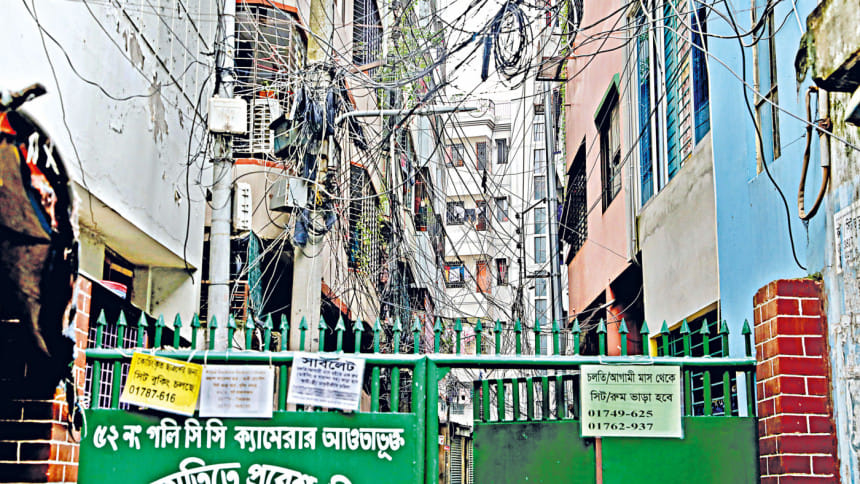Rising house rent piles pressure on low-income people

Accommodation costs in Bangladesh have risen further amid persistently high inflation during the April-June period this year, placing an additional burden on many of the country's middle and lower-income people.
The House Rent Index (HRI), which measures house rent growth on a quarterly basis, rose to 5.88 percent in the last three months of fiscal 2023-24, up by 0.04 percentage points from the January-March period.
Compiled by the Bangladesh Bureau of Statistics (BBS), the HRI takes into account the cost of rent across three categories of households, namely concrete (pucca), corrugated iron sheet (semi-pucca) and mud houses (katcha and jhupri).
The concrete house category saw the highest rent growth during this year's April-June period, with its related index number rising by 5.51 percent year-on-year to 113.63, as per HRI data.
Similarly, the corrugated iron sheet segment saw its index number rise 6.48 percent year-on-year to 116.14 at the same time.
House rent is included in the non-food category of the consumer price index, according to the BBS.
But with commodity prices also spiralling upwards, the growing house rent is putting pressure on low-and fixed-income groups that are already grappling with inflationary pressure.
Momota Rani, a resident of Mirpur in Dhaka, said her rent was hiked by Tk 1,700 per month in April.
"But our income hasn't increased in line with the growth of grocery and other household expenses amid high inflation over the past year," she added.
Against this backdrop, Momota said the hike in house rent came as an extra burden that forced her to slash her family's Tk 8,000 monthly grocery budget by Tk 1,000.
"I am now very careful with other expenses," Momota added.
Momota also informed that as per the agreement with her landlord, the rent was not supposed to be increased until April 2025.
"But he already increased the rent citing the persisting high inflation," Momota said while adding that renters are often asked to vacate their houses if unable to meet the rent.
"And even if you want to leave, it is difficult to find suitable housing in Dhaka," she told The Daily Star.
Khalid Hasan, a graduate of the Bangladesh University of Engineering and Technology residing in Dhaka's Lalbagh, said he and his roommates had to pay Tk 21,600 per month to rent a three-room flat in 2023.
But after the rent was hiked by Tk 2,000 in January this year, Khalid and his roommates were forced to leave and rent a smaller apartment that suited their financial capacity.
"I have to live on the money I earn from providing private tuition. So, the higher cost of daily essentials and rent forced us to cut our expenses," he said.
Besides, the higher house rent is forcing many limited and middle-income households to sublet their spare rooms and share costs.
According to the Bangladesh Sample Vital Statistics of the BBS, more than two lakh households across both city corporations of Dhaka were sublet in 2022.
Also, the annual report on demographic data compiled by the state-run statistical agency showed that 70,000 of these households were sublet for the first time.
As such, the number of subtenants in Dhaka rose by 2.73 percentage points to 7.64 percent of the city's population, indicating that more people were cutting their expenses to battle the inflationary pressure. Inflation in Bangladesh has hovered above 9 percent since March last year.
Likewise, the number of sublessors in Dhaka rose by 0.15 percentage points to 2.05 percent of the population, which stood at 1.02 crore in 27 lakh households, as per the Population and Housing Census 2022.
At the divisional level, Sylhet has the highest concentration of subtenants, with 6.8 percent of its population sharing their homes, while Dhaka and Barishal follow with 4.2 percent each.
The data also shows that the practice of subletting is highest in urban areas.
SM Nazar Hossain, vice-president of the Consumers Association of Bangladesh, said property owners are raising the house rent at will even in this time of high inflation.
Hossain said homeowners can take advantage of how the demand for houses in Dhaka exceeds supply to quote higher rent.
This is because although the Premises Rent Control Act was enacted three years ago, there is no implementation of the law.
"If the act is enforced, then rent costs could be somewhat controlled," he said, adding that the government should play an effective role in this regard.


 For all latest news, follow The Daily Star's Google News channel.
For all latest news, follow The Daily Star's Google News channel. 



Comments